
Section 4. Bilateral water cooperation between the countries of Central Asia
Due to the complicated epidemiological situation in 2020, almost all interactions between countries were via telephone calls or videoconferencing.
4.1. КKazakhstan-Kyrgyzstan


High-level сontacts
In the course of telephone conversations, the President of Kazakhstan K.-J. Tokayev and the President of Kyrgyzstan S.Jeenbekov discussed implementation of the agreements reached following the President Tokayev’s state visit to the Kyrgyz Republic in November 2019, cooperation in the area of digital technologies in order to ease cargo transportation procedures at customs borders (3 February), major aspects of bilateral cooperation (10 February), countering the spread of coronavirus (19 March), joint steps in maintaining momentum of trade and economic cooperation under the pandemic conditions (19 March, 27 March, 4 May), and water sharing issues (27 March).
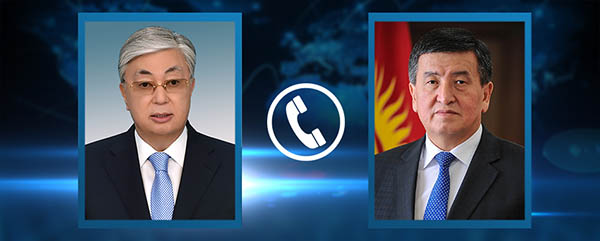
While confirming a shared commitment to enhancing friendship, good-neighborly relations and strategic partnership, the President K.-J. Tokayev and the acting President and Prime Minister of Kyrgyzstan S.Japarov addressed key considerations on the bilateral agenda through telephone exchange (13 November).
Source: akorda.kz
Cooperation within the Chu-Talas Water Commission
Bilateral water relations between Kazakhstan and Kyrgyzstan are regulated by the Agreement on the Use of Water Management Facilities of Intergovernmental Status on the Chu and Talas Rivers (21 January 2000). The Chu-Talas Water Commission (СTWC) is a joint body, which is to ensure the joint operation of the water facilities of interstate use and estimate operational costs required for their safe and reliable operation.
Meetings. Over the period from 2006 to 2020, 27 Commission meetings were held. In May 2020, at the 27th videomeeting the Commission addressed the issues related to operation regimes of interstate water facilities on the Chu and Talas Rivers in the 2020 growing season, allocated funds and the work done at the facilities in 2019, amending the 2000 Agreement, and the outputs of the CTWC Secretariat Working Groups on environment protection, adaptation to climate change and long-term development programs. The Parties also discussed repair and rehabilitation of interstate water facilities following the end of the growing season and other matters related to water management of the transboundary rivers. Given the tragedy of the Sardoba dam collapse in the territory of Uzbekistan, the Commission decided to carry out a joint visual check of the Orto-Tokoy and Kirov reservoirs for their safety.
Working Groups and other activities. On 19 December 2019 at the 26th СTWC meeting, it was decided to divide the Strategic Action Program (SAP) into a joint basin-wide (possibly to be approved by the СTWC Co-Chairs) and national (to be approved at the national levels) components. In the first half of 2020, SAP continued to be finalized. The Working Group on adaptation to climate change and long-term development programs held its six videomeetings with the support of UNDP in Kazakhstan and Kyrgyzstan (14-20 May). The objective was to discuss the Joint Basin-wide Action Program for the Chu and Talas Rivers for 2022-2030, agree on tasks, interventions, expected outcomes, performance indicators, responsible parties, and deadlines on the following priorities: water quantity, water quality, ecosystem preservation, climate change and emergencies, monitoring, and cooperation. The Joint Basin-wide Action Program is an integral part of the Strategic Action Program for the Chu and Talas Rivers Basins developed within the framework of the GEF-UNDP-UNECE project “Enabling Transboundary Cooperation and Integrated Water Resources Management in the Chu and Talas River Basins” (2015-2018). The results of the six meetings were reported at the 27th CTWC meeting. Four online meetings were organized in Kazakhstan and Kyrgyzstan in order to discuss the National Action Plans (NAPs) on such priorities as water quantity, water quality, ecosystem preservation and the procedures for submission and getting approval of NAPs in the countries (11-20 June). To date, all procedures on SAP approval with the interested public bodies in Kazakhstan and Kyrgyzstan have been completed. The outcomes will be reported at the 28th CTWC meeting.
Due to the pandemic, the CTWC Secretariat Working Group on environment protection (WGEP) has done one water sampling exercise only in the Chu and Talas Rivers, including tributaries and canals at the agreed 16 points for 17 hydrochemical indicators (October). This was done with the financial support of the OSCE Office in Nur-Sultan and UNDP. During the 8th WGEP meeting, the results of water sampling were presented, and the WGEP Work Plan 2021 was agreed upon (17 November via videoconferencing).
Source: Head of the Kazakh Party of the СTWC Secretariat
Other water-related arrangements
The Chairman of the State Committee for Industry, Energy and Subsoil Use of the Kyrgyz Republic Ye. Osmonbetov and the Vice-Minister of Ecology, Geology and Mineral Resources of Kazakhstan Ye. Nysanbayev signed a protocol on the exchange of electricity during the growing season 2020 and the electricity supplies from Kazakhstan to Kyrgyzstan in 2020 (26 May). According to the protocol, in order to ensure water releases during the growing season, the parties will exchange electricity up to 300 MkWh at a nominal price of US $0.0000001 per 1 kWh for equivalent water releases through the Uch-Kurgan HPP in amount of up to 330 Mm3. Electric energy will be delivered from Kyrgyzstan to Kazakhstan in June-August and further returned from Kazakhstan to Kyrgyzstan from September to November. The Kazakh party pledged to pay for electric energy transmission services through the national Kyrgyz grids 0.21 Som per 1 kWh (excluding VAT 12%) for a total amount of up to 70.56 million Som (including VAT).
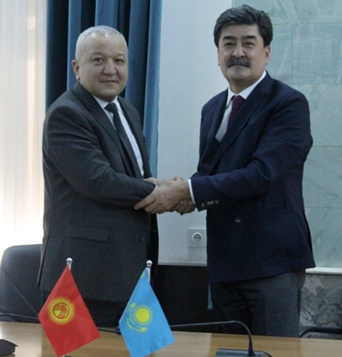
For the efficient use of water and energy in the Toktogul reservoir during the low-water season, it has been agreed that the Kazakh side will deliver 500 million kWh of electricity at US$ 0.024 per 1 kWh on DAP terms (Incoterms 2010) in September-December. In the past, Kyrgyzstan already imported electricity from Kazakhstan during the low-water years: at US$0.05 per 1 kWh in 2015 and US$0.03 per 1 kWh in 2016.
Sources: vb.kg, kaktus.media
4.2. Kazakhstan-Turkmenistan


High-level сontacts
The President of Kazakhstan K.-J.Tokayev and the President of Turkmenistan G.Berdymukhamedov had a telephone conversation on 29 June. The Heads of State confirmed their commitment to deepening dialogue at the highest level and noted promising prospects in the development of strategic partnership, especially in trade and economy.
Source: akorda.kz
4.3. Kazakhstan-Tajikistan


High-level сontacts
In the course of telephone conversations, the President of Kazakhstan K.-J.Tokayev and the President of Tajikistan E.Rahmon discussed the global pandemic of the coronavirus (April 9), expansion of strategic partnership (October 5, October 12), and developments in Kyrgyzstan, focusing on appropriate solutions to the crisis through negotiations (7 October). The President of Kazakhstan congratulated Emomali Rahmon on the occasion of his re-election as the President of Tajikistan (12 October).
President E.Rahmon also discussed the Tajik-Kazakh relations with the First President of the Republic of Kazakhstan N.Nazarbayev (6 July, 5 October).
Sources: president.tj, akorda.kz
4.4. Kazakhstan-Uzbekistan


High-level сontacts
The President of Uzbekistan Sh.Mirziyoyev received the Prime Minister of Kazakhstan A.Mamin, who arrived in Uzbekistan as part of the Second Inter-Regional Cooperation Forum between the two countries (25 February). The talks were focused on prospects of expanding cooperation in energy, agriculture, education, culture and other priority areas. Particular attention was paid to creating favorable conditions for maintaining high rates of mutual trade, as well as promoting cooperation projects and infrastructure development with the participation of leading companies of the two countries.
Source: president.uz
A work meeting was held between the President of Uzbekistan Sh.Mirziyoyev and the First President of Kazakhstan N.Nazarbayev on 25 September. The presidents discussed the current state and prospects of bilateral strategic partnerships, touched upon the development of regional partnership, particularly within the framework of agreements reached following the Second Consultative Meeting of the Heads of Central Asia States in November 2019 in Tashkent.
Source: president.uz
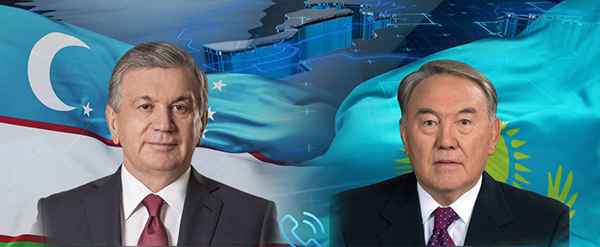
The Presidents of Uzbekistan and Kazakhstan held several telephone conversations, during which they discussed the epidemiological situation and measures to counter the spread of coronavirus infection and minimize its negative impact on bilateral trade and economic relations (18 March, 2 May, 8 May, 17 May); underlined the importance of continuing activities of the Joint Intergovernmental Commission headed by prime ministers of the both countries (2 May) and early implementation of trade and economic agreements, including preparation and promotion of promising projects in agriculture, processing industry and other sectors (8 May); emphasized the need for activation of institutional mechanisms for dialogue and enhancement of joint efforts to increase mutual trade and investment, development of cooperation projects in industry, agriculture, transport and logistics and other priority areas (17 May); exchanged views on developments in the region, expressed hope for rapid stabilization in Kyrgyzstan (7 October); noted the importance of facilitation of economic cooperation projects included in the roadmap of mutually beneficial cooperation between Uzbekistan and Kazakhstan (12 November); discussed how to deepen a dialogue within the framework of international and regional organizations, including CIS and SCO (12 November, 1 December).
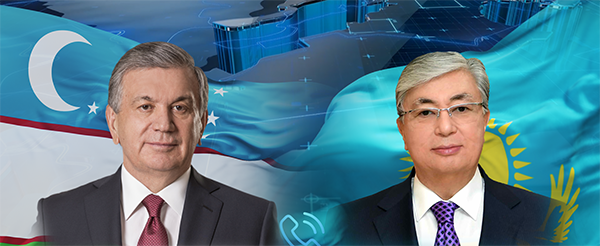
The President K.-J.Tokayev and the President Sh.Mirziyoyev hold extension discussions on the situation and organization of close coordination on recovery from Sardoba reservoir accident in the border regions of the countries. The Presidents instructed the governments to ensure coordinated work and prompt resolution of all emerging issues (2 May); agreed on further priority steps to provide targeted assistance to population and rebuild infrastructure in the affected areas (8 May); noted the importance of efficient interaction and undertaken measures to eliminate consequences of the emergency situation (17 May).
President Sh.Mirziyoyev also regularly communicated with the First President N.Nazarbayev. In the course of telephone conversations, they discussed measures to prevent the spread of the coronavirus infection (20 March, 8 May, 22 June) and recovery from the Sardoba dam collapse in the border regions (8 May); emphasized the important role of the Joint Intergovernmental Commission chaired by prime ministers of the two countries in developing new projects and areas of cooperation to minimize negative effects of the pandemic (8 May); exchanged views on topical points of the international and regional agenda (1 December).
Sources: akorda.kz, president.uz
The Uzbek and Kazakh regions develop trade and economic cooperation. A meeting of the governmental delegations at the head of the Prime Ministers of Uzbekistan and Kazakhstan took place on 26 February. It concluded with the signature of the Final Declaration of the Second Interregional Cooperation Forum between the Republic of Uzbekistan and the Republic of Kazakhstan. Also the Parties adopted 16 other inter-agency and interregional documents.
Source: www.gov.uz
Meetings of the Working Group on Water Management
In 2020, the Minister of Ecology, Geology and Natural Resources of Kazakhstan M.Mirzagaliyev and the Minister of Water Management of Uzbekistan Sh.Khamraev had several meetings.
On 5 February, the ministers met in Tashkent to discuss prospects of bilateral water cooperation.
On 14 May, the ministers held a bilateral meeting in Shymkent to discuss the future of the Sardoba reservoir; measures taken by the Parties for the 2020 growing season in the Syr Darya River basin; draft Bilateral Intergovernmental Agreement on joint management, use and protection of transboundary waters; projects on construction of the Pskem and Mullalak HPPs on the Pskem River and the Nizhnechatkal HPP on the Chatkal River; construction of a diversion canal in the reach between DP 61 and DP 73 of the Dostyk interstate canal in the territory of Uzbekistan; joint work for drafting water balance of the Syr Darya River; consideration of water withdrawal limits in the Karadarya and Chirchik River basins at ICWC meetings.
On 2-3 July, the ministers met in Tashkent and discussed the following: a draft Roadmap of water cooperation; implementation of joint technical survey and monitoring of hydraulic structures built and reconstructed after 1991; draft water agreement between the Government of Kazakhstan and the Government of Uzbekistan. As a result, the Roadmap of water cooperation between the Republic of Uzbekistan and the Republic of Kazakhstan was signed. In particular, the Roadmap provides for joint technical survey and monitoring of hydraulic structures constructed and reconstructed since 1991 and joint measures to ensure additional discharges from the upstream reservoirs.
On 2 November in Tashkent, Minister Sh.Khamraev and Vice-Minister of Ecology, Geology and Natural Resources of the Republic of Kazakhstan Ye.Nysanbayev met as part of negotiations between the Deputy Prime Minister, Minister of Investment and Foreign Trade of Uzbekistan S.Umurzakov and the Deputy Prime Minister of Kazakhstan R.Sklyar.
On 21 November, Minister M.Mirzagaliyev and Minister Sh.Khamraev met in Turkestan as part of negotiations between the Prime Ministers of the two countries.
In 2020, more than 10 videomeetings were organized to discuss the draft Agreement between the Government of the Republic of Kazakhstan and the Government of the Republic of Uzbekistan on Joint Management and Use of Transboundary Waters.
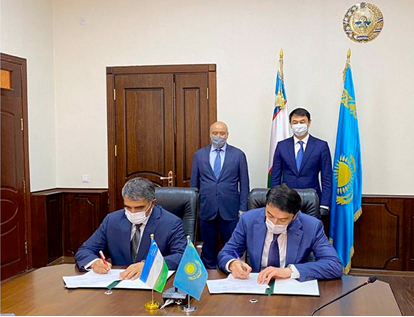
Signing the Roadmap, 3 July 2020, Tashkent.
Credits: twitter.com/MirzagalievKZ
Source: Ministry of Water Management of the Republic of Uzbekistan
Kazakh-Uzbek Joint Working Group (Commission) on Environment Protection and Water Quality in the Syr Darya River Basin
The Kazakh-Uzbek Joint Working Group (Commission) on Environment Protection and Water Quality in the Syr Darya River Basin (hereinafter Working Group) is formed of experts from Uzbekistan and Kazakhstan in line with the Strategy for Economic Cooperation 2017-2019 between Kazakhstan and Uzbekistan. The Strategy was signed during the visit of the President of Uzbekistan Sh.Mirziyoyev to Kazakhstan, as well as the Agreement between the Government of the Republic of Kazakhstan and the Government of the Republic of Uzbekistan on cooperation in the field of environmental protection and environmental management on 2 June 1997.
According to Regulations, the Working Group meets once a year. Its tasks are as follows: analysis of monitoring capacities and the compatibility of national methodologies, including evaluation of resource needs for harmonization; development of instructions for joint monitoring of surface water quality, with account of national standards, for maintaining a unified and comparable quality assurance system; development of recommendations on capacity building for the surface water quality monitoring program; regular water quality monitoring and information exchange; exchange of environmental regulatory and technical documents; development of joint measures to prevent and respond to pollution in transboundary rivers; identification of sources that have a negative effect on water quality, adoption of preventive measures and exchange of information on them; development of an early warning mechanism on pollution; initiation of joint projects involving international experts, financial and donor institutions; preparation of joint proposals on involvement of upstream countries in the Syr Darya River basin in cooperation on water quality issues. Activities of the Group are carried out on the basis of annual plans.
Meetings. By 1 January 2021, the Working Group had three meetings.
During the 1st meeting, the Working Group discussed the issues of state environment monitoring in the two republics and the environmental status of the transboundary Syr Darya River, adopted the Regulations of the Group, and approved its composition and the Work Plan for 2018-2020 (27-28 September 2018, Tashkent).
At the 2nd meeting, the Parties summarized the results of implementation of the work plan 2019 (7-8 November 2019, Nur-Sultan). Particularly, in 2019, members of the Working Group from Uzbekistan visited Shymkent to get acquainted with the activities of specialized laboratories that monitor the quality of water resources (13-14 March), and experts of the Kazakh party visited the laboratories in Tashkent (15-16 May). A list of 28 surface water quality indicators for joint monitoring has been established; the most acceptable measurement procedures explored; a proposal for sampling points and the frequency of analysis prepared; a survey of the territory of the Syr Darya River basin carried out.
At the 3rd meeting, the work progress on the agreed water sampling and water quality data exchange were presented, the Parties presented also the results of joint observations over water quality in the Syr Darya River, and the criteria for assessing water quality were compared. The Parties summed up the Work Plan for 2020, approved the Work Plan for 2021-2022. Representatives of the Republic of Tajikistan were invited to join the Group. The Parties took note of the proposal of IWAC to jointly implement the project “Improvement of Mechanisms for Preventing and Responding to Pollution of the Syr Darya River in Emergency Situations” (24 December via videoconferencing).
Joint monitoring of 28 surface water quality indicators is to be delivered as part of activities of the Working Group. According to the Work Plan, joint sampling on the Syr Darya River should be carried out on a quarterly basis at 4 agreed border sampling points – two in Uzbekistan and two in Kazakhstan. In 2019-2020, 5 joint water samplings and information exchange were organized. Starting from January 2020, information exchange has been carried out by e-mail according to minutes of the second meeting, approved Work Plan and agreed order of information submission. The results of the joint sampling were discussed at the meetings.
Source: carececo.org
On interactions between Kazakhstan and Uzbekistan for recovery from the Sardoba dam collapse see Thematic Reviews.
4.5. Kyrgyzstan-Tajikistan


High-level сontacts
The President E.Rahmon and the President S.Jeenbekov discussed through telephone calls the entire range of aspects related to bilateral relations, placing a special emphasis on the situation in border areas of the two countries and on delimitation of the state border line (11 January); reached an agreement to continue on a permanent basis relevant working groups of the parties (24 January); stressed the importance of working closely together to contain further cross-border spread of coronavirus and the urgency of even greater coordination of efforts at the regional level (28 March).
Source: president.tj
4.6. Kyrgyzstan-Turkmenistan


High-level сontacts
The President of Kyrgyzstan S.Jeenbekov and the President of Turkmenistan G.Berdymukhamedov had a telephone conversation on 29 June. The Heads of State discussed perspectives of Kyrgyz-Turkmen cooperation and outlined joint plans for its enhancement.
Source: president.kg
4.7. Kyrgyzstan-Uzbekistan


High-level сontacts
In the course of telephone conversations, the President of Kyrgyzstan S. Jeenbekov and the President of Uzbekistan Sh. Mirziyoyev discussed the current spread of coronavirus and supported measures taken by countries to minimize negative consequences of the pandemic primarily for the development of trade and economic relations (27 March, 4 May, 1 June); addressed the issues related to recovery from the accident at the Sardoba dam (4 May); supported the proposal on holding regular meetings of the joint Intergovernmental Commission and the Uzbek-Kyrgyz Council of the Heads of Border Region Administrations (1 June); discussed new areas for mutually beneficial cooperation, as well as the prospects for regional cooperation and important infrastructure projects (24 July).
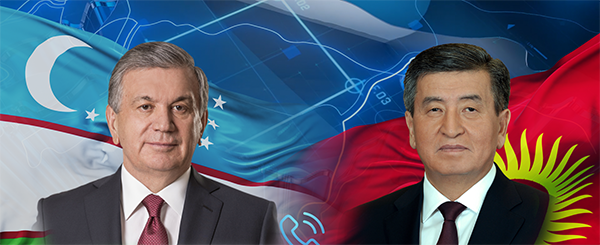
The President of Uzbekistan Sh.Mirziyoyev and the Acting President of the Kyrgyz Republic S.Japarov through a telephone call considered key aspects of bilateral relations in the spirit of friendship, good neighborliness and strategic partnership, paid special attention to joint projects and programs and the need to strengthen activities of the Intergovernmental Commission on Delimitation and Demarcation of the State border, the Joint Commission on Bilateral Cooperation and the Council of Borderland Heads (14 November).
Sources: president.kg, president.uz
Meetings of the Working Group on Water Management
In 2020, there were no bilateral meetings between the Kyrgyz and Uzbek sides.
4.8. Tajikistan-Uzbekistan


High-level сontacts
The President of Tajikistan E.Rahmon received the Prime Minister of Uzbekistan A.Aripov, who arrived in Dushanbe for a work visit (29 September). The parties drew attention to positive trends in development of bilateral relations, including the active work of the Intergovernmental Commission on Trade and Economic Cooperation. The President of Tajikistan, while mentioning the priority of Tajik-Uzbek relations in Tajikistan's foreign policy, emphasized the importance of constant political contacts at the highest level. Taking into account the global threat of COVID-19, the Parties spoke in favor of taking measures to prevent the negative impact of the world economy crisis on dynamics of trade and economic relations between the two countries. Other promising areas of cooperation were identified in the fields of hydropower and road infrastructure.
Source: president.tj
In the course of telephone conversations, the President E.Rahmon and the President Sh.Mirziyoyev discussed current issues of bilateral cooperation and drew attention to implementation of the reached agreements, including the adopted Roadmap, establishment of a joint fund for promotion of mutually beneficial cooperation projects (3 April); focused on collaboration and close coordination to prevent the spread of coronavirus infection (3 April, 9 April, 5 May); addressed the issues related to recovery from the Sardoba dam collapse (5 May); exchanged views on the situation in the region, focusing on recent events in Kyrgyzstan (7 October); reviewed the schedule of upcoming summits (7 October); and, discussed aspects of multifaceted cooperation (12 October).
Sources: president.tj, president.uz
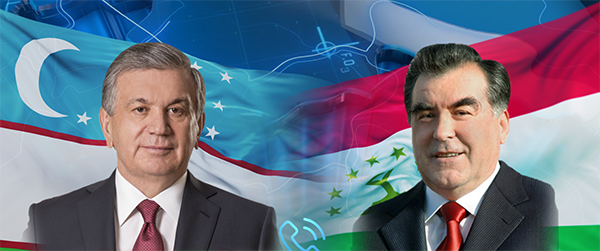
Meetings of the Working Group on integrated transboundary water use in Central Asia
As part of the state visit of the President of Uzbekistan to the Republic of Tajikistan, an Uzbek-Tajik Working Group on integrated transboundary water use in Central Asia was established (9-10 March 2018). By 1 January 2021, the Working Group had three meetings: on 6 June 2018 in Tashkent, on 28 November 2018 in Dushanbe, and on 15 July 2020 via videoconferencing.
At the meeting on 15 July 2020, the Working Group discussed the current water situation in the Syr Darya River basin and implementation of the trilateral protocol of the working meeting of Kazakh, Tajik and Uzbek Parties on mutual approval of operation regime of the Bakhri Tojik reservoir for July-August 2020.
Other water-related arrangements
In 2018, Uzbekistan and Tajikistan resumed energy supplies between the countries. In 2019, 1.4 billion kWh of electricity was exported from Tajikistan to Uzbekistan at a price of 2 cents/kWh. The total electricity export from Tajikistan to Uzbekistan amounted to US $28.5 million.
In 2020, the AO “NES Uzbekistan” and the Barki Tojik company signed an agreement to supply electricity from Tajikistan to Uzbekistan in the period from May to September (2 May). Due to the reduced inflow of water into the Vakhsh River and water shortage in reservoirs, it has been reported that electricity imports from Tajikistan have decreased (25 July). The average daily supply decreased from 12 to 0.3 million kWh. At the beginning of August, to provide the population and economic sectors with electricity, the Barki Tojik company cancelled power export contracts with Uzbekistan and Afghanistan ahead of schedule. To overcome this situation, the AO “NES Uzbekistan” signed a contract with Turkmenenergo on import of electricity since 28 July 2020 and imposed restrictions on domestic consumption. In early September, the Barki Tojik reported that the Nurek reservoir was filled, and electricity exports to Afghanistan resumed. According to the Barki Tojik, 358 million kWh was exported to Uzbekistan in the first half of 2020.
Cooperation on the Zeravshan River
In August 2018, during the state visit of the President of Tajikistan to Uzbekistan, the Parties agreed to explore possibilities of joint construction of two hydropower projects (320 MW in total) on the Zeravshan River in Tajikistan. See the 2019 Yearbook, Section 4 for details. In 2020, the authorized agencies of the countries continued working on this issue.
On 28-29 January 2020, the first meeting of country working groups took place in Tashkent. The Tajik delegation was headed by the Deputy Minister of Energy and Water Resources D.Shoimzoda and the Uzbek delegation – by the First Deputy Minister of Energy J.Mirzamakhmudov. The draft intergovernmental agreement on the order and conditions of shared participation in construction and operation of HPPs on the Zeravshan River was discussed during the meeting. After reaching agreements, the details will be fixed in the Agreement.
According to the Uzbek Ministry of Energy, the 2nd meeting of the Joint Working Group was scheduled for March 2020 in Dushanbe. It was planned to discuss the changes made by the Uzbek side affecting the protection of investments, the mechanism for resolution of controversial issues, the order of purchase of electricity generated by the Uzbek side and other issues. However, due to the coronavirus pandemic, the meeting has been postponed.
4.9. Turkmenistan-Uzbekistan


High-level сontacts
In the course of telephone conversations, the President G.Berdymukhamedov and the President Sh.Mirziyoyev discussed how to strengthen bilateral relations in the spirit of friendship, good-neighborliness and strategic partnership and expand multifaceted cooperation (18 March, 27 March); drew attention to the positive dynamics of cooperation and fruitful interagency interactions in trade, energy, transport and transit, industry and agriculture (6 May); touched on issues related to the recovery from the Sardoba dam collapse (6 May); exchanged views on the epidemiological situation due to the spread of coronavirus infection (6 May); supported the continuation of active contacts between the border regions, as well as the expansion of educational, cultural and humanitarian exchanges, and reached an agreement to work on joint programs and projects within the framework of the bilateral Intergovernmental Commission (29 June, 11 December); spoke on the need to promote cooperation projects, primarily in trade, industry, energy, transit, agriculture, and other key sectors to effectively counter the effects of the global spread of coronavirus infection; discussed implementation of the agreements reached in the course of regular Consultative Meeting of the Heads of Central Asia State in Tashkent in November 2019; identified security, economy, innovation, transport, tourism, science, education, and culture as priorities for multilateral cooperation among the countries in the region; emphasized the need to resolve the situation in the Kyrgyz Republic as soon as possible (8 October); and, identified priorities for future cooperation (11 December). The President of Turkmenistan congratulated the Head of Uzbekistan on fruitful CIS chairmanship and successful summit (21 December).
Source: president.uz
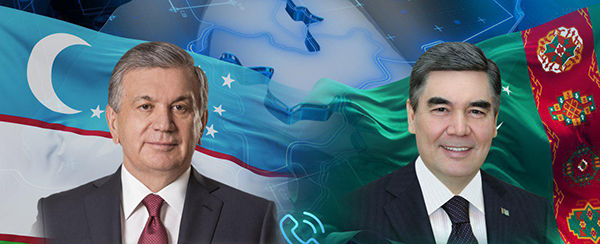
Bilateral meetings on water management
On 18 September 2020, the Minister of Water Management of Uzbekistan Sh. Khamraev and the Chairman of the State Committee for Water Resources of Turkmenistan G. Baidjanov held a video-conference. The following issues were discussed: (1) state of water resources of the Amu Darya River; (2) water availability for irrigation of winter wheat and other agricultural crops in the middle and lower reaches of the Amu Darya River; (3) joint actions to improve water availability in future.
On 30 October, the ministers through a videoconferencing addressed the following issues: 1) the state of water resources of the Amu Darya River; 2) the dates for termination of irrigation of winter wheat and other crops in areas adjacent to the Amu Darya River; 3) water sharing in the middle and lower reaches of the Amu Darya River and accumulation of water in the Tuyamuyun reservoir; 4) maintenance of hydraulic structures located in the border areas of the Parties; 5) approval of the terms for measures on strengthening the dam of the Sultansandjar reservoir; 6) signature of the draft Agreement “On the joint Uzbek-Turkmen Intergovernmental Water Commission between the Government of the Republic of Uzbekistan and the Government of Turkmenistan”.
Source: Ministry of Water Management of the Republic of Uzbekistan
Water cooperation between Uzbekistan and Turkmenistan is also maintained within the framework of the trilateral Working Group, which includes BWO Amu Darya as well. The Parties constructively, in the spirit of mutual trust and respect for each other's interests, solve the issues related to sharing waters of this river. By 1 January 2021, the Group had 219 meetings, including 15 meetings in 2020. The heads of water management organizations of the Amu Darya lower reaches discussed water allocation during the meetings.
Source: BWO Amu Darya